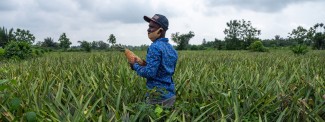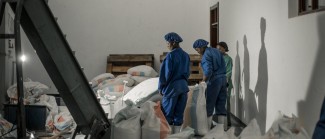Pandemic response highlights resilience of already-fragile countries
On 22 February 2020, South Sudan established a national unity transitional government, putting an end to a conflict that lasted six years. Less than a month later, the COVID-19 pandemic hit.
The government reacted quickly, taking measures to prevent the spread of the disease, including suspending flights, closing schools and non-essential businesses, and putting a curfew in place. Neighbouring countries began restricting their cereal exports, leading many in South Sudan to stock up on food, and prices of essential items like maize rose by 36%. Restrictions on movement meant smallholder farmers and traders struggled with accessing markets, essential tools and quality seed.
Compounding these challenges, the sharp fall in global oil prices has significantly impacted government revenue, which depends on crude oil for 98% of its budget.
“The sudden drop in revenue makes it more challenging to finance a comprehensive national response to COVID-19. We are working together with government and partners to build on the inherent resilience capacity of the South Sudanese people and reduce their vulnerability, especially to the COVID-19 pandemic,” said Jose Manzano, UNDP’s Senior Programme Advisor in South Sudan.
Least prepared to respond
On the current trajectory, up to two-thirds of the world’s poor will live in fragile and conflict-affected countries by 2030, according to the World Bank. And, as the COVID-19 crisis unfolds, those countries are least prepared to respond. According to the recently launched COVID-19 and Human Development Report, the world’s poorest countries have, on average, 2.5 doctors and 7 hospital beds per 10,000 people.
“If we take Yemen as an example, only 51% of health facilities are fully operational. This means two-thirds of Yemenites have no access to basic healthcare,” Luisa Bernal, Policy Specialist at UNDP, said.
“And then you add sanitation and hygiene issues where people don’t have access to clean water and it means the simplest action you can take to protect yourself and your family – washing your hands – is just not feasible.”
According to the UN High Commissioner for Refugees, every day 37,000 people are forced to flee their homes because of persecution and violence. More than 70 million people have been forcibly displaced worldwide, many of whom are living in overcrowded settlements.
“Refugees and displaced populations are particularly vulnerable groups and the pandemic and measures to halt its spread is increasing the strain on host communities to provide support and essential services. It’s a very difficult situation,” said Bernal.
If we take Yemen as an example, only 51% of health facilities are fully operational. This means two-thirds of Yemenites have no access to basic healthcare.
Luisa Bernal, UNDP Policy Specialist
Thankfully, the number of coronavirus cases in most fragile countries is still relatively low. But, the socioeconomic implications of the global, regional and local countermeasures to COVID-19 are already hitting fragile countries harder than others, said Habib Ur Rehman Mayar, Deputy General Secretary of the g7+, an intergovernmental organisation representing 20 fragile and conflict-affected countries.
“In Somalia, for example, 49% of revenue comes from remittances. This has dropped by more than 50% because of lockdown measures in the US and UK that has meant Somalis working there have lost their jobs. Now they don’t have any money to send back to family in Somalia who depend on this financial support,” Mayar said.
Reframing international support
The g7+ enables fragile countries to share experiences and join together to advocate for country-led and country-owned processes in addressing fragility and conflict. The group was formed out of a need to improve the effectiveness of international aid.
“Fragile states have often been referred to as failing states or failed states. This terminology implies that these countries do not have capacity to even understand their own problems, which is not true,” Mayar said.
“We are trying to change that narrative. We say ‘yes, our institutions and economies are fragile’, because of decades of war or natural and manmade disasters, but it doesn’t mean that the populations and leaders lack the understanding of their own challenges and solutions.”
“We advocate that the international community let these countries define their challenges and identify their needs and provide them with the needed support to achieve stability rather than imposing solutions that are not context sensitive,” Mayar said.
The g7+ recently launched a call for support to curb COVID-19 in fragile countries. They’re calling for a full and permanent global ceasefire, scaled up healthcare assistance, care for displaced people stranded due to border closures, debt relief and investments in food security, regional cooperation, technological innovation and alternative sources of financing.
“The first priority for people in countries that are in conflict is to make and build peace. This is the time to realise that we all have one common enemy and that’s COVID-19.”
“Peace will depend on economic and social wellbeing, and also protecting the development gains that have been made.”
An integrated response
UNDP is at the centre of UN-wide efforts to maintain economic and social wellbeing via its COVID-19 Integrated Response. This means helping countries prepare, respond and recover from the crisis in a way that integrates support to health systems, inclusive crisis management and addressing socioeconomic impacts.
“During the preparatory phase, we’re helping countries raise awareness, obtain supplies and strengthen systems so that essential services can continue,” she said.
In South Sudan, this has meant capitalizing on the presence of vocational schools supported by UNDP and mobilizing tailors in the nationwide production and distribution of facemasks.
“This is providing a social safety net for about 300 people, mainly women, who would otherwise not have work and income due to the general business slowdown as a result of COVID,” said Manzano.
The first priority for people in countries that are in conflict is to make and build peace. This is the time to realise that we all have one common enemy and that’s COVID-19.
Habib Ur Rehman Mayar, g7+ Deputy General Secretary
In the response phase, Bernal said, they are focusing on supporting the continued function of the public and private sector, particularly small- and medium-sized enterprises.
South Sudan is intending to set up mobile markets and rolling stores to address food security issues brought about by COVID lockdowns. This approach will enable traders, producers and healthcare professionals to provide communities across the country with access to food, essential items and information.
The recovery phase focuses on ways to utilise this crisis to seize opportunities to improve long-term outcomes and build resilience. One of the ways the UN is facilitating this is through its Connecting Business Initiative – a platform to connect global capabilities with in-country needs.
“The private sector has of course been affected by COVID-19 but it can also be a respondent and a partner in supporting governments and stakeholders through the crisis,” Bernal said.
“For instance, we’ve seen long truck queues at border crossings because drivers are required to undertake COVID testing. Connecting countries with companies that have experience in efficient trade facilitation measures could help introduce effective but less restrictive measures that benefit the country beyond this crisis,” she said.
Remembering our humanity
Sustaining peace requires the international community to step up its support for economic recovery, Mayar said.
“We hope that fragile countries are given debt relief. Their meager resources are rarely enough to provide needed care to their citizens during COVID-19. Failing to do so threatens the foundation of stability in these countries, most of which are on the verge of relapsing into crisis that will become a global threat,” he said.
Mayar hopes to raise awareness among the international community and in people around the world as to the plight of people living amid fragility and conflict, and who are experiencing the pandemic’s impacts on top of that.
“People in fragile countries have lived in lockdowns and curfews for months and in situations where even getting their basic necessities becomes a nightmare,” he said.
“Sometimes politics in international relations is guided on the assumptions of realism where actions of states are motivated by their respective national interest. We can forget that we are all one human family, dependent on each other.”
“I hope that this crisis helps nations and their leaders realise that we all can survive challenges like COVID-19 only if we cooperate with each other.”
-------------
For a recent discussion of the topic in May 2020, please see our webinar recording here.
Header image - ©Violeta Gonzalez/EIF
If you would like to reuse any material published here, please let us know by sending an email to EIF Communications: eifcommunications@wto.org.



